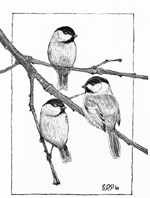In Season: Carolina Chickadee
Scratchboard and Story by Gary Pendleton
Click on the scratchboard image for a larger image
 Well known and loved, the Carolina chickadee makes it hard for humans to resist feeling sentimental. The small, energetic and spirited chickadee is indeed a cute little bird. Its happy-sounding chick-a-dee song and lively countenance make it a favorite of anyone who ever put out a bird feeder. Well known and loved, the Carolina chickadee makes it hard for humans to resist feeling sentimental. The small, energetic and spirited chickadee is indeed a cute little bird. Its happy-sounding chick-a-dee song and lively countenance make it a favorite of anyone who ever put out a bird feeder.
For all their seeming cheerfulness, they are wild animals, eking out a short and presumably harsh existence. In Robert Frost’s poem “Snow,” the character Meserve speaks of small birds and their ability to endure the frigid cold.
Their bulk in water would be frozen rock in no time tonight.
And yet tomorrow they will come budding boughs from tree to tree,
Flirting their wings and singing chickadee.
Don’t think that their spunk is a show put on for our sakes.
In the text of the popular field guide Birds of North America, Marylander Chandler Robbins describes chickadees as “friendly birds.” Biologists usually avoid statements that attribute human qualities to animals, so Robbins’ willingness to anthropomorphise seems a testament to the chickadee’s appeal to us human creatures.
I can’t say that chickadees feel friendly toward people or any other living things, but I do believe that their presence makes the world a more cheerful place.
You’ll see chickadees at your feeder all winter long.
Copyright 2000
New Bay Times Weekly
|